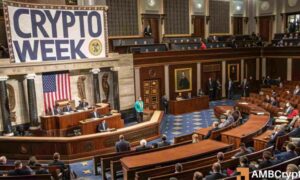A New Era for Crypto Taxation: Senator Cynthia Lummis’s Groundbreaking Bill
U.S. Senator Cynthia Lummis has introduced pioneering legislation aimed at reforming the taxation structure surrounding digital assets like Bitcoin. With cryptocurrency gaining traction in the financial landscape, Senator Lummis’s bill intends to alleviate the complexities and burdens of current tax regulations, positioning the United States to remain competitive in an ever-growing digital economy. This article will explore the key features of the proposed bill and what it means for American cryptocurrency users and investors.
One of the standout features of Senator Lummis’s bill is the introduction of a de minimis exemption for small crypto transactions. Essentially, this provision permits transactions under $300 to be tax-free, which means everyday purchases, like that morning coffee, can be made using cryptocurrency without incurring any tax obligations. Additionally, the cap on tax-free gains is set at $5,000 per year, providing even greater flexibility for casual users. Starting in 2026, this threshold will adjust for inflation, ensuring that the legislation remains relevant in the long term. The goal here is clear: to simplify everyday crypto usage and encourage more widespread adoption among average Americans.
The bill also tackles pressing issues regarding crypto mining and staking, where current tax rules can create financial strain. Presently, miners and stakers are liable for taxes as soon as they receive tokens, regardless of whether those tokens have been sold. Senator Lummis’s bill seeks to amend this by establishing that tax obligations will only arise when the tokens are sold or utilized. This critical change aims to enhance cash flow management for miners and stakers, making it easier for them to plan financially while reducing the chances of potential cash flow crises.
Furthermore, the legislation aims to streamline the process of crypto lending and charitable donations. By extending existing tax rules for securities lending to digital assets, lending out cryptocurrency temporarily will no longer subject individuals to crypto taxation. This move aims to invigorate lending markets and foster liquidity in the crypto space, benefiting both lenders and borrowers. For charitable giving, the bill proposes eliminating the costly and complicated appraisal requirement typically associated with donating actively traded digital assets. This alteration promises to make it much easier for individuals to contribute to worthy causes using their cryptocurrencies, thereby promoting charitable acts within the crypto community.
Another crucial focus of the bill is the introduction of a mark-to-market accounting option. This would allow traders to report their income based on the year-end values of their assets, rather than only upon actual sales. Such a change would simplify the tax reporting process for many traders and potentially reduce tax liabilities. Senator Lummis appears committed to fostering a more nuanced and equitable tax environment for crypto users, thereby aligning rules better with contemporary trading practices.
Despite her intentions, Senator Lummis faced challenges in attaching her comprehensive crypto tax reforms to larger legislation, like the Big Beautiful Bill. However, her recent proposal indicates a willingness to simplify her initial vision, especially by concentrating on easing tax liabilities for Bitcoin miners to prevent double taxation. By systematically addressing these pressing issues, Senator Lummis showcases a proactive approach to regulation that promotes innovation while protecting investors and users alike.
In summary, Senator Cynthia Lummis’s recent bill represents a significant advance toward more equitable and simplified tax treatment for digital assets in the United States. By addressing critical areas such as transaction exemptions, mining taxation, crypto lending, and charitable contributions, the proposed legislation aims to create a conducive environment for cryptocurrency adoption and usage. As public comments are invited and discussions commence, this initiative could mark the beginning of a new era for digital asset taxation and innovation in America.
















